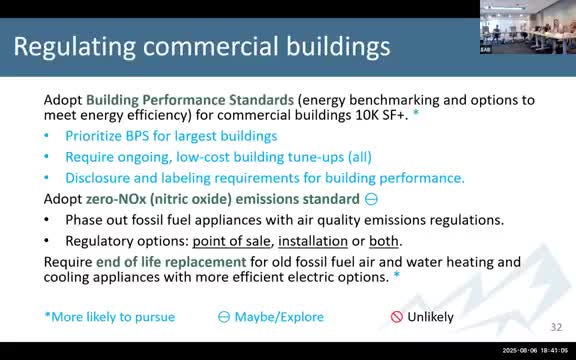Boulder Proposes New Building Performance Standards for Energy Efficiency and Transparency
August 08, 2025 | Boulder, Boulder County, Colorado
Thanks to Scribe from Workplace AI , all articles about Colorado are free for you to enjoy throughout 2025!

This article was created by AI using a video recording of the meeting. It summarizes the key points discussed, but for full details and context, please refer to the video of the full meeting. Link to Full Meeting
One of the key recommendations is to adopt a local building performance standard that is either aligned with or more stringent than the existing state regulations for buildings over 50,000 square feet. This would also include developing standards for smaller buildings, which are currently unregulated. The board emphasized the importance of prioritizing larger buildings, as they contribute significantly to emissions, while considering phased approaches for smaller structures to facilitate compliance.
Transparency in building performance was another focal point, with discussions around potential disclosure and labeling programs that would inform tenants about energy efficiency and emissions. This initiative aims to empower tenants to make informed leasing decisions based on the environmental performance of buildings.
The board also addressed air pollution standards, particularly concerning NOx emissions from appliances. While there are legal challenges regarding electric-only requirements, the board is exploring performance standards that could mitigate air pollution without overstepping regulatory boundaries.
In terms of residential buildings, the board proposed consolidating regulations for multifamily properties under a unified program, as they are currently exempt from the building performance standards. This would include ongoing maintenance and transparency measures to inform tenants about their living environments.
The meeting also touched on the need to revise existing regulations that inadvertently incentivize natural gas appliances in smaller residential buildings. The board is considering adjustments to ensure that new rentals do not promote less efficient energy sources.
Additionally, the board discussed the potential for pre-approved high-performing designs for accessory dwelling units (ADUs) but decided to prioritize existing building codes for now.
To support these initiatives, the board recommended reallocating existing rebate funds to focus on lower-income households and strengthening tenant protections. This approach aims to couple incentives for building performance improvements with measures that protect vulnerable tenants from rising costs.
Workforce development was identified as a crucial element in driving down costs associated with building upgrades. The board expressed a commitment to partnering with local organizations to enhance job creation in the green building sector.
The meeting concluded with a recognition of the financial barriers many residents face in undertaking energy efficiency upgrades. The board is advocating for a bill financing program that would allow residents to finance improvements through their utility bills, making it more accessible for homeowners and businesses to invest in sustainability.
Overall, the discussions at the Boulder City Environmental Advisory Board meeting reflect a proactive approach to enhancing building performance standards, promoting transparency, and addressing environmental challenges while considering the economic realities faced by the community. The board plans to continue exploring these recommendations and their implications for Boulder’s future sustainability efforts.
Converted from 8-6-25 Environmental Advisory Board Meeting meeting on August 08, 2025
Link to Full Meeting
Comments
View full meeting
This article is based on a recent meeting—watch the full video and explore the complete transcript for deeper insights into the discussion.
View full meeting
